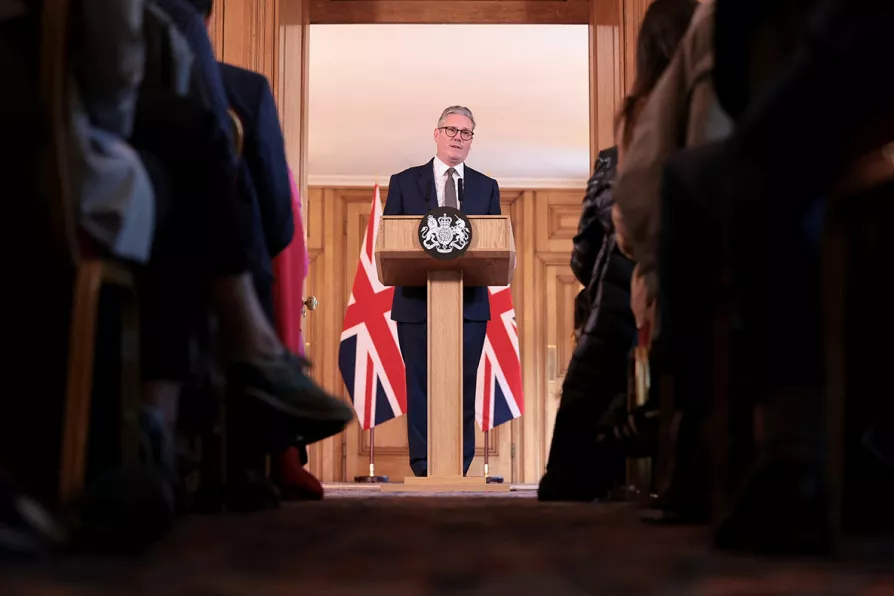CHRISTOPHE DOMEC speaks to CHRIS SMALLS, who helped set up the Amazon Labor Union, on how weak leadership debilitates union activism and dilutes their purpose

 Prime Minister Sir Keir Starmer speaks during a press conference after his first Cabinet meeting at 10 Downing Street, London, following the landslide General Election victory for the Labour Party, July 6, 2024
Prime Minister Sir Keir Starmer speaks during a press conference after his first Cabinet meeting at 10 Downing Street, London, following the landslide General Election victory for the Labour Party, July 6, 2024
“You turn if you want to. The lady’s not for turning!” former prime minister Margaret Thatcher said in her speech to the Conservative Party Conference on October 10 1980. But U-turning has been a trait of many politicians before and not least since.
Think John Major and the poll tax, Tony Blair and the referendum on the EU constitution, Nick Clegg and tuition fees, Boris Johnson and free school meals and Liz Truss and her tax proposals.
And the new PM, Labour’s Keir Starmer, has also done his fair share of U-turning. Starmer, among other things, pledged and promised to “increase income tax for the top 5 per cent earners” in 2020, during the Labour leadership election — “I will maintain our radical values [ … ] no stepping back from our core principles” as he added in the pledges. Only for him to back away from tax rises.
“We are in a different situation now, because obviously I think we’ve got the highest tax burden since World War II,” he told the BBC in May, when asked about this policy pledge.
Starmer has also essentially abandoned several other pledges, such as to nationalise public services like mail and water companies and the abolition of university tuition fees, among other of his 10 pledges from 2020.
“We are likely to move on from that commitment, because we do find ourselves in a different financial situation,” he told the BBC when asked about tuition fees.
More cake
Labour’s so-called “missions” for Britain (a “long-term plan to get Britain’s future back” that “will drive forward a Labour government”) instead include sticking “tough fiscal rules with economic stability at their heart.”
In Labour’s election manifesto, the party promises not to raise income tax and keep corporation tax at the current level. And in a speech at the launch of the manifesto — that was interrupted by a climate protester — Starmer said that wealth creation is Labour’s number one priority.
“Some people say that how you grow the economy is not a central question — that it’s not about how you create wealth, but how you tax it, how you spend it, how you slice the cake, that’s all that matters. So let me be crystal clear — this manifesto is a total rejection of that argument,” Starmer added.
When in opposition back in 1979, two months before she became PM, Thatcher had said something similar to Starmer’s cake analogy in a speech at the Conservative local government conference: “We can improve our position as a nation only by working together to create greater wealth. We cannot do it by each fighting for a bigger share of the existing cake. The cake is too small.”
If the new PM really wants to turn Britain around and keep his political momentum, he will need more than economic stability, growing cakes and political dilly dallying, however. He will need to improve the lives of ordinary people, as well as keep his promises, principles and integrity.
But Labour’s election manifesto does not even contain the sort of spending plans needed to protect public services from future cuts, the Institute for Fiscal Studies says in a response to the manifesto.
“Delivering genuine change will almost certainly also require putting actual resources on the table. And Labour’s manifesto offers no indication that there is a plan for where the money would come from to finance this,” the IFS adds.

The 2025 Budget shores up the PM’s political position with headline-grabbing welfare U-turns, but with no improvements on offer to declining public services or living standards, writes MICHAEL BURKE

Sixty Red-Green seats in a hung parliament could force Labour to choose between the death of centrism or accommodation with the left — but only if enough of us join the Greens by July 31 and support Zack Polanski’s leadership, writes JAMES MEADWAY

JOE GILL looks at research on the reasons people voted as they did last week and concludes Labour is finished unless it ditches Starmer and changes course










